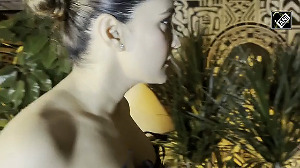

Remember a time when the United States grew so furious with France over going to war in Iraq that it rephrased everything French -- including fries, beans and kisses -- to Freedom? Little wonder that DJ Cheb-i-Sabbah, who drifted to America from Paris, chose to find freedom far from the madding Bible Belt and settle in that most permissive of North American cities, San Francisco.
If you are a globetrotting club crawler with a soft spot for the city of the Golden Gate, chances are that a late evening Pacific fog drove you indoors into a nightclub. As the evening waned, you might remember -- if you remember at all -- grooving to house music punctuated with a curious global sound -- snatches of Algerian rai, lilts of Arabic vocals and, through the bass-heavy layering, the unmistakable chant of bhajans and the looping alaap of ragas.
If you know your music, you would have recognised the sound of Asian Massive. And the man at the turntable might have been Cheb-i-Sabbah.
"My name means young of the morning," he says of the moniker he embraced 17 years ago. Gaunt and soft-spoken, the 56-year-old DJ and world music producer is recognised as a father figure of the Electronica-based musical form that was born, as revolutions often are, in the nightclubs of France and Germany. 'Spinners' like him transported it to dance floors across the world. But he laughs off the distinction -- "I'm not even Asian"-- and hands the honours to South Asian electronic musicians like Karsh Kale, Talvin Singh and the Delhi duo Midival Punditz.
"Music from Arabia, Africa and South Asia was being played in discos in France and Germany as early as the Sixties," says Cheb, puffing on the quintessential DJ fixture, a cigarette. His black yogi-like locks, thinly streaked with grey, are bundled into a dishevelled ponytail. He wears a maroon t-shirt and orange chequered pyjamas, and his eyes twinkle through round-framed glasses as he speaks with the slow, deliberate air of a mystic. "We were playing it even before it became world music as we know it."
His recent albums Krishna Leela (2002), MahaMaya - The Remixes (2000) and Shri Durga (1999) released by the San Francisco label Six Degrees, are testimony to the atmospheric sound that South Asian clubbers everywhere are grooving to. Those unfamiliar with Cheb now have reason to know him better -- he features on the soundtrack of the new desi movie Where's The Party, Yaar?
 For about four decades, Cheb has been spinning -- first at discotheques and later in studios. When every third teenager wandering through the smoke rings of the Sixties wanted to play a guitar, this Algerian escaped his family's Andalusian musical tradition and made a trip to Paris. "I grew up with music playing all around me, there was no need to pay to listen to it," he says with a grin. "But like all teenagers, I rebelled." By 1964, he was spinning 7" vinyl records "with one song on each side" at Paris discotheques.
For about four decades, Cheb has been spinning -- first at discotheques and later in studios. When every third teenager wandering through the smoke rings of the Sixties wanted to play a guitar, this Algerian escaped his family's Andalusian musical tradition and made a trip to Paris. "I grew up with music playing all around me, there was no need to pay to listen to it," he says with a grin. "But like all teenagers, I rebelled." By 1964, he was spinning 7" vinyl records "with one song on each side" at Paris discotheques.
"It was hard work," he recalls, sipping cutting chai seated on a couch in what will be, in two weeks, a swank new tapas and world music bar in Bandra, Mumbai. "We worked six nights a week playing soul music -- we could not play anything else -- and also afternoons for the underage crowd who could not be served alcohol."
Every DJ worth his vinyl was trying out in Paris at that time, and it was a tough scuffle for the turntable. "The real test for a DJ is that he should never let the dance floor down," Cheb says. "We always tried to be one up on each other but in the morning all the DJs had breakfast together."
Cheb soon discovered Persian music, Carnatic ragas and Hindustani -- especially the vocal music of the Dagar brothers and the Pakistani Ali brothers, Salamat Ali Khan and Nazakat Ali Khan, the doyen of the Sham Chaurasi gharana. When Cheb eventually met Ustad Salamat Ali Khan -- he touches his ears in reverence as he says the name -- the latter introduced him to a friend saying, "He knows me for 15 years," implying that Cheb had been listening to his music for that long.
Nusrat Fateh Ali Khan, whom he worked with, shared a sliver of practical wisdom: the importance of give and take between audience and musician. It was useless, Khan told him, to be a good musician when there were no good listeners.

But those were the days when DJs were heroes only of spin. "Everything we mixed was owned by the discotheque," he says. "We weren't allowed to take it out."
Things are different now. DJs, Cheb feels, are seen as sutradhars in theatre, orchestrating the mood and tempo of the participating audience. "Music, like theatre, must allow the audience to participate," he says. "That's why dance is one of the most intense forms of participation."
"Young people are the most sincere in expressing what they like and don't like about music," says the DJ. "When you are young, all you think about is music." He ascribes the pervasive popularity of hip-hop to that instinct.
Cheb continues to vest hope in the American Dream. "America is a place where the world came together," he says. "It did not belong to anyone, except the Native Americans. It's the only place in the world where the people who live there did not originate there, but came from all over the world, from different cultures, and made it their home. And they brought their music with them."
"It's the only place," he adds, "where Indians and Pakistanis come together on the dance floor."
Though purists may argue that jazz is America's only true contribution to music, Cheb feels the commingling of cultures created the opportunity for various musical styles to come together, orchestrated by DJs.
"You realise the energy that people express in dance when you play music that they are familiar with," he says. "Sometimes I play a little bhangra and all the Indians start shouting for joy. And then I play a little Arabic music, and that makes some other people happy."
DJs, he believes, are reviving the ancient tribal instinct of bringing people of various cultures together in one place to dance. "These are crazy times, and people need to come together like never before, and that is the DJ's role -- to make them come together."
Cheb, who has visited India six times since 1970, says club-goers were previously not receptive to his style. "They wanted me to play trance," he says. "But I told them to give my music a chance.
He has reason to believe that things are different now.
"There was a time when every kid wanted to buy a guitar, but now they are saving that money to buy a turntable and a mixer," he says. But access to equipment alone, he feels, won't make great DJs. "Every kid who played guitar didn't become a John McLaughlin or a Jimi Hendrix," he grins. "It's the same thing with all music."
"The music may go out of fashion," Cheb says about Asian Massive. "But the world will remember such a tradition existed."
"For me, music is about surrender to Krishna," says Cheb. Then he adds with a laugh, "For the DJ it's about hitting the sa, the right note. But the joke is that you spend one half of your life trying to hit the sa, and the other half messing it all up. How good you are depends on which you do first."
Photographs: Jewella C Miranda. Design: Lynette Menezes
DJ Cheb-i-Sabbah will spin at the opening of Tres Botas, a new tapas and world music bar in Bandra, Mumbai on September 25 and for two nights thereafter.






 © 2025
© 2025